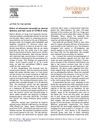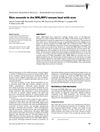 1 citations,
November 2008
1 citations,
November 2008 Yonnyuniksoogobon-dan taken orally promotes hair growth by affecting growth factors in hair roots.
3 citations,
December 2014 in “Daehan miyong hakoeji” 21 citations,
January 2020 in “Pharmaceutical Biology” Salvia plebeia extract can stimulate hair growth.
 8 citations,
April 2020 in “Journal of Ethnopharmacology”
8 citations,
April 2020 in “Journal of Ethnopharmacology” Herbs might help with hair loss, but more research is needed to confirm their safety and effectiveness.
5 citations,
April 2022 in “Pharmaceutics” Minoxidil nanoparticles significantly boost hair growth in mice compared to regular minoxidil.
 28 citations,
September 2019 in “International Journal of Nanomedicine”
28 citations,
September 2019 in “International Journal of Nanomedicine” Minoxidil nanoparticles can potentially be a more effective treatment for hair growth than current treatments.

Sinsun-yukza-hwan extract promotes hair growth in mice.
 12 citations,
March 2021 in “Molecules”
12 citations,
March 2021 in “Molecules” Cedrol Nanoemulsion was found to be more effective at promoting hair growth than traditional treatments and had better bioavailability.
 March 2024 in “International Journal of Pharmaceutics”
March 2024 in “International Journal of Pharmaceutics” Ginsenoside Rg3 combined with minoxidil was more effective in treating hair loss in mice.
October 2022 in “International Journal of Molecular Sciences” Fish collagen peptides can significantly promote hair growth.
 September 2024 in “International Journal of Molecular Sciences”
September 2024 in “International Journal of Molecular Sciences” Hydrangea serrata extract may promote hair growth and improve hair health.
May 2009 in “고려인삼학회 학술대회”  9 citations,
March 2015 in “Journal of Microbiology and Biotechnology”
9 citations,
March 2015 in “Journal of Microbiology and Biotechnology” Ultra-high molecular weight poly-γ-glutamic acid may help promote hair growth.
 February 2023 in “Laboratory Animal Research”
February 2023 in “Laboratory Animal Research” Cudrania tricuspidata and Sargassum fusiforme extracts improved hair growth in mice by affecting growth-related genes.
 14 citations,
March 2015 in “Clinical and Experimental Dermatology”
14 citations,
March 2015 in “Clinical and Experimental Dermatology” Human placental extract and minoxidil together significantly promote hair growth.
May 2024 in “International Journal of Molecular Sciences” Mouse hair follicle stem cells can help prevent Type 1 Diabetes.
 February 2024 in “ACS Omega”
February 2024 in “ACS Omega” The Shen Bai Hair Growing Decoction may help treat hair loss by promoting hair growth and reducing inflammation.
 6 citations,
March 2011 in “Experimental Dermatology”
6 citations,
March 2011 in “Experimental Dermatology” Too much or too little selenium in the diet can cause hair loss and graying in mice.
 3 citations,
January 2016 in “Biotechnology and Bioprocess Engineering”
3 citations,
January 2016 in “Biotechnology and Bioprocess Engineering” Laminaria japonica extract with IGF-1 improved mouse hair growth and could be a potential alopecia treatment.
 7 citations,
January 2013 in “The journal of investigative dermatology/Journal of investigative dermatology”
7 citations,
January 2013 in “The journal of investigative dermatology/Journal of investigative dermatology” T-cell reconstitution after thymus transplantation can cause hair whitening and loss.

Calorie restriction changes the elemental and isotopic makeup of mouse hair and bone.
 23 citations,
October 2006 in “Journal of Dermatological Science”
23 citations,
October 2006 in “Journal of Dermatological Science” Ethosomal minoxidil improves hair growth by penetrating deeper into skin and shortening hair cycle.
 23 citations,
January 2021 in “Biomedicine & Pharmacotherapy”
23 citations,
January 2021 in “Biomedicine & Pharmacotherapy” DHT stops hair regrowth in mice, similar to human hair loss.
 41 citations,
September 2011 in “Journal of Ethnopharmacology”
41 citations,
September 2011 in “Journal of Ethnopharmacology” Panax ginseng extract helps mice grow hair.
 4 citations,
April 2011 in “International Journal of Radiation Biology”
4 citations,
April 2011 in “International Journal of Radiation Biology” Radiation significantly slows down wound healing in mice.
 6 citations,
December 2019 in “BMC Complementary and Alternative Medicine”
6 citations,
December 2019 in “BMC Complementary and Alternative Medicine” Alcohol extract from Vernonia anthelmintica seeds may help treat stress-related hair loss.
 26 citations,
February 2003 in “The journal of investigative dermatology/Journal of investigative dermatology”
26 citations,
February 2003 in “The journal of investigative dermatology/Journal of investigative dermatology” An enzyme other than TNAP might be responsible for vitamin B-6 metabolism in the skin.
 22 citations,
August 1999 in “Experimental Dermatology”
22 citations,
August 1999 in “Experimental Dermatology” Certain drugs can cause early hair growth in mice by affecting the nerves.
 51 citations,
January 2006 in “Wound Repair and Regeneration”
51 citations,
January 2006 in “Wound Repair and Regeneration” MRL/MpJ mice's skin wounds heal with scars, unlike their ear wounds which can regenerate.
8 citations,
April 2016 in “Experimental dermatology” B6.Cg-Tyr c−2J Hr hr /J mice have a stronger delayed sunburn reaction and are good for UV research.























